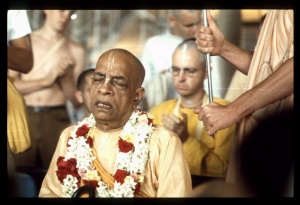SB 7.6.14: Difference between revisions
No edit summary |
(Vanibot #0054 edit - transform synonyms into clickable links, which search similar occurrences) |
||
| Line 23: | Line 23: | ||
<div class="synonyms"> | <div class="synonyms"> | ||
''kuṭumba'' | ''[//vanipedia.org/wiki/Special:VaniSearch?s=kuṭumba&tab=syno_o&ds=1 kuṭumba]'' — of family members; ''[//vanipedia.org/wiki/Special:VaniSearch?s=poṣāya&tab=syno_o&ds=1 poṣāya]'' — for the maintenance; ''[//vanipedia.org/wiki/Special:VaniSearch?s=viyat&tab=syno_o&ds=1 viyat]'' — declining; ''[//vanipedia.org/wiki/Special:VaniSearch?s=nija&tab=syno_o&ds=1 nija]-[//vanipedia.org/wiki/Special:VaniSearch?s=āyuḥ&tab=syno_o&ds=1 āyuḥ]'' — his lifetime; ''[//vanipedia.org/wiki/Special:VaniSearch?s=na&tab=syno_o&ds=1 na]'' — not; ''[//vanipedia.org/wiki/Special:VaniSearch?s=budhyate&tab=syno_o&ds=1 budhyate]'' — understands; ''[//vanipedia.org/wiki/Special:VaniSearch?s=artham&tab=syno_o&ds=1 artham]'' — the interest or purpose of life; ''[//vanipedia.org/wiki/Special:VaniSearch?s=vihatam&tab=syno_o&ds=1 vihatam]'' — spoiled; ''[//vanipedia.org/wiki/Special:VaniSearch?s=pramattaḥ&tab=syno_o&ds=1 pramattaḥ]'' — being mad in material conditions; ''[//vanipedia.org/wiki/Special:VaniSearch?s=sarvatra&tab=syno_o&ds=1 sarvatra]'' — everywhere; ''[//vanipedia.org/wiki/Special:VaniSearch?s=tāpa&tab=syno_o&ds=1 tāpa]-[//vanipedia.org/wiki/Special:VaniSearch?s=traya&tab=syno_o&ds=1 traya]'' — by the threefold miserable conditions (''adhyātmika'', ''adhidaivika'' and ''adhibhautika''); ''[//vanipedia.org/wiki/Special:VaniSearch?s=duḥkhita&tab=syno_o&ds=1 duḥkhita]'' — being distressed; ''[//vanipedia.org/wiki/Special:VaniSearch?s=ātmā&tab=syno_o&ds=1 ātmā]'' — himself; ''[//vanipedia.org/wiki/Special:VaniSearch?s=nirvidyate&tab=syno_o&ds=1 nirvidyate]'' — becomes remorseful; ''[//vanipedia.org/wiki/Special:VaniSearch?s=na&tab=syno_o&ds=1 na]'' — not; ''[//vanipedia.org/wiki/Special:VaniSearch?s=sva&tab=syno_o&ds=1 sva]-[//vanipedia.org/wiki/Special:VaniSearch?s=kuṭumba&tab=syno_o&ds=1 kuṭumba]-[//vanipedia.org/wiki/Special:VaniSearch?s=rāmaḥ&tab=syno_o&ds=1 rāmaḥ]'' — enjoying simply by maintaining the members of the family. | ||
</div> | </div> | ||
Latest revision as of 23:04, 18 February 2024

A.C. Bhaktivedanta Swami Prabhupada
TEXT 14
- kuṭumba-poṣāya viyan nijāyur
- na budhyate 'rthaṁ vihataṁ pramattaḥ
- sarvatra tāpa-traya-duḥkhitātmā
- nirvidyate na sva-kuṭumba-rāmaḥ
SYNONYMS
kuṭumba — of family members; poṣāya — for the maintenance; viyat — declining; nija-āyuḥ — his lifetime; na — not; budhyate — understands; artham — the interest or purpose of life; vihatam — spoiled; pramattaḥ — being mad in material conditions; sarvatra — everywhere; tāpa-traya — by the threefold miserable conditions (adhyātmika, adhidaivika and adhibhautika); duḥkhita — being distressed; ātmā — himself; nirvidyate — becomes remorseful; na — not; sva-kuṭumba-rāmaḥ — enjoying simply by maintaining the members of the family.
TRANSLATION
One who is too attached cannot understand that he is wasting his valuable life for the maintenance of his family. He also fails to understand that the purpose of human life, a life suitable for realization of the Absolute Truth, is being imperceptibly spoiled. However, he is very cleverly attentive to seeing that not a single farthing is lost by mismanagement. Thus although an attached person in material existence always suffers from threefold miseries, he does not develop a distaste for the way of material existence.
PURPORT
A foolish man does not understand the values of human life, nor does he understand how he is wasting his valuable life simply for the maintenance of his family members. He is expert in calculating the loss of pounds, shillings and pence, but he is so foolish that he does not know how much money he is losing, even according to material considerations. Cāṇakya Paṇḍita gives the example that a moment of life cannot be purchased in exchange for millions of dollars. A foolish person, however, wastes such a valuable life without knowing how much he is losing, even according to monetary calculations. Although a materialistic person is expert in calculating costs and doing business, he does not realize that he is misusing his costly life for want of knowledge. Even though such a materialistic person is always suffering threefold miseries, he is not intelligent enough to cease his materialistic way of life.